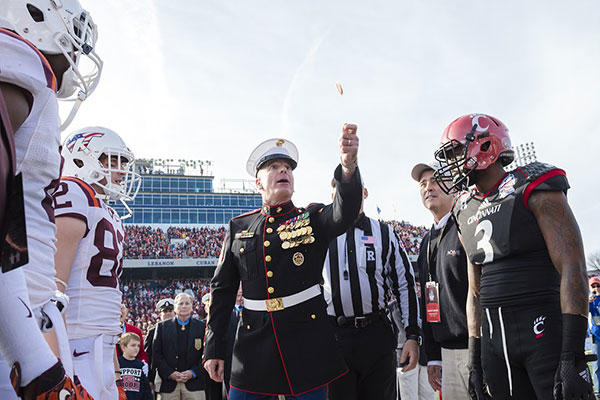WASHINGTON — Resiliency has been a central theme of Marine Corps Sgt. Maj. Bryan B. Battaglia's time as senior enlisted advisor to the chairman of the Joint Chiefs of Staff.
As co-champion of DoD's Total Force Fitness program, which takes a mind-body-spirit approach to fitness in support of readiness, Battaglia visited thousands of troops around the world to talk about resiliency's importance in their own lives and in the lives of their families.
The program provided a framework for the military services to build their own resiliency programs, enabling each service to adapt the concepts to their own unique needs, he said in an interview with DoD News.
He explained that all the services are different in their own ways, but they're identical in their concept, scope and initiative; they all have the ability to maintain a resilient service member, family member, unit and organization. "Readiness has a direct connection into resiliency," Battaglia said. "If you're not resilient, your readiness is not going to be as high as it should be, and that affects warfighting and that affects the ability for our men and women to do the nation's bidding. It's all connected."
Changing What it Means to be Fit
Battaglia said he knows the program works because it worked for him.
"We as a military have changed our culture — it's still in progress — but changed our culture on fitness; meaning [not just] running and pullups and sit-ups and crunches. While that is fitness, Total Force Fitness is a much more holistic way of looking at well-being and readiness," the sergeant major said.
He said senior leaders being willing to take a public stand, such as former Sergeant Major of the Army Command Sgt. Maj. Raymond Chandler III, who has discussed his own struggles with post-traumatic stress following a rocket explosion in Iraq, "helps younger folks to say 'Hey, if they can do it, maybe I can do it too.'"
Battaglia acknowledged the lingering stigma out in the force, "but, boy, have we gotten much better with it," he said. "That credit needs to go to folks who are not ashamed and who have the sort of courage and comfortability to stand in public or stand before subordinates and say 'I did it.' And that was my small contribution — that at one time I was affected and impacted by the stigma of saying, 'You know what? I'm not as fit as I used to be. I'm not as fit as I think I should be. Let me see someone about it.'
"As I gave it an honest look, I saw what Total Force Fitness could do, but it also showed me how unfit I was," the sergeant major said.
Recognizing When There's a Problem
In 2005, Battaglia was injured in Iraq and was eventually diagnosed with post-traumatic stress. But, he said, if it wasn't for his wife, he would never have admitted to himself that something wasn't right.
"It was Lisa who really enlightened the seriousness of how unfit [I was]. You know, you would have expected that if it wasn't myself [who noticed] it would have been my NCO or my boss or somebody who is as close. ... But they don't sleep in the same bed at night, so spouses ... see things, hear things and witness things that we sometimes don't see ourselves," Battaglia said.
"That was the breaking of the ice. All prior to that, the post-deployment health assessments all contained various questions — 'Of course I'm ok, of course I'm ok. I'm ready to go; I'm ready to go back again.' That's what we train for, that's the strength that we're expected to have," he said.
But, the sergeant major emphasized, recognizing that you need help and seeking it out when it's needed is a critical piece of total fitness.
"We want that to happen, because if it's left untreated, that's where the liability and vulnerabilities come in, and the risk even increases," .he said. "We want to get them whatever help they need to manage the injury or the illness, thereby returning the mind, body and spirit to an optimal level of performance."




























